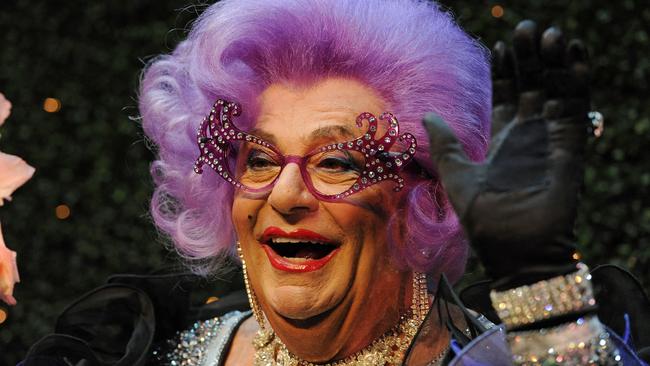Modern Australia has forgotten to laugh at it itself
For decades, Australians have explored their many cultures and suburban social mores through television and film. Why haven’t we found a modern-day Dame-Edna iteration for the 2020s?

I shouldn’t be surprised by the strength of this connection but I am. It is the relationship between popular television programs and demographic trends. The marketing departments of TV networks are clearly adept at understanding (and at monetising) ascendant social forces.
Take, for example, the US drama series Thirtysomething (1987-1991), depicting the lives of a group of baby boomers in their thirties. The market for such a program was always going to peak in the late 1980s, precisely three decades after the 1950s baby boom.
I always regarded this show’s successor, Friends (1994-2004), as an edgier, funnier, younger version of the far more interesting pre-family stage of the life-cycle. Friends reset the agenda. Even the setting for the show was different, with the edginess of the Manhattan skyline. Friends normalised inner-city living and perhaps laid the foundation for the later hipsterfication of the city centre.
Australia’s suburban culture is perhaps best captured by the soap opera Neighbours (1985+), which projected the Middle Australia way of life across the world. Britain has long been partial to this version of Australian life.
Not as long-lasting as Neighbours but also highly influential at the time was The Sullivans (1976-1983), set in Melbourne. Here was the story of a suburban family’s trials and tribulations as told throughout the war years.
Interestingly, there were no popular dramatisations of inner-city living in Australia across the 1980s and 1990s. Series such as The Secret Life of Us (2001-2005), set in St Kilda, didn’t surface until the trend towards inner-city living was well underway.
The inner-city exception, I think, was a show called My Name’s McGooley, What’s Yours? (1966-1968) staring Gordon Chater as McGooley and John Meillon as his hapless son-in-law Wally. It was set in Sydney’s Balmain before gentrification. Wally’s life was always one of quiet pathos, I thought.
But all these iterations of everyday Australian life fade into oblivion when compared with the movie The Castle (1997) featuring Darryl Kerrigan and family. It surely remains Australia’s favourite self-depiction: funny, authentic, good-humoured, unpretentious. Darryl is naive, not nasty. He loves his family and his family loves him. These are traditional values. And yet here we are 27 years later and unlike other comedic platforms The Castle is still loved. It still resonates. It has survived the revisionist condemnations of the diversity movement despite the achingly traditionalist values of its characters.
The same might be said of Kath & Kim, which for 20 years has teasingly parodied Australia’s suburban way of life.
For decades, Australians have explored their many cultures and, often, suburban social mores via the medium of television and film. And yet we still haven’t found a parody, a modern-day Dame-Edna iteration, a 2020s version of Kath & Kim, a new incarnation of our beloved Darryl Kerrigan that comedically encapsulates the social, cultural and linguistic mores of inner-city life.
The pickings are so rich, the demographics so unique. Surely there’s a grant somewhere for just this kind of project.






To join the conversation, please log in. Don't have an account? Register
Join the conversation, you are commenting as Logout